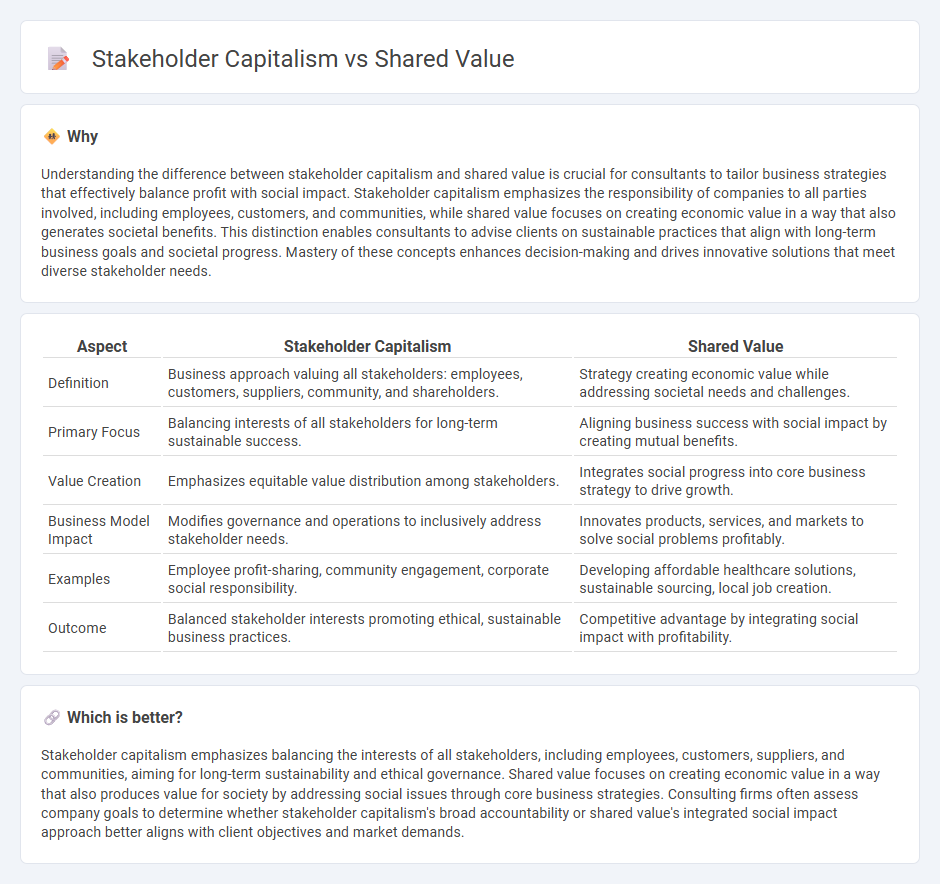
Stakeholder capitalism prioritizes the needs and values of all parties involved in a business, including employees, customers, suppliers, and the community, fostering sustainable growth and ethical practices. Shared value focuses on creating economic value in a way that also generates value for society by addressing its challenges, aligning business success with social progress. Explore how consulting strategies can leverage these approaches to drive impactful organizational change.
Why it is important
Understanding the difference between stakeholder capitalism and shared value is crucial for consultants to tailor business strategies that effectively balance profit with social impact. Stakeholder capitalism emphasizes the responsibility of companies to all parties involved, including employees, customers, and communities, while shared value focuses on creating economic value in a way that also generates societal benefits. This distinction enables consultants to advise clients on sustainable practices that align with long-term business goals and societal progress. Mastery of these concepts enhances decision-making and drives innovative solutions that meet diverse stakeholder needs.
Comparison Table
| Aspect | Stakeholder Capitalism | Shared Value |
|---|---|---|
| Definition | Business approach valuing all stakeholders: employees, customers, suppliers, community, and shareholders. | Strategy creating economic value while addressing societal needs and challenges. |
| Primary Focus | Balancing interests of all stakeholders for long-term sustainable success. | Aligning business success with social impact by creating mutual benefits. |
| Value Creation | Emphasizes equitable value distribution among stakeholders. | Integrates social progress into core business strategy to drive growth. |
| Business Model Impact | Modifies governance and operations to inclusively address stakeholder needs. | Innovates products, services, and markets to solve social problems profitably. |
| Examples | Employee profit-sharing, community engagement, corporate social responsibility. | Developing affordable healthcare solutions, sustainable sourcing, local job creation. |
| Outcome | Balanced stakeholder interests promoting ethical, sustainable business practices. | Competitive advantage by integrating social impact with profitability. |
Which is better?
Stakeholder capitalism emphasizes balancing the interests of all stakeholders, including employees, customers, suppliers, and communities, aiming for long-term sustainability and ethical governance. Shared value focuses on creating economic value in a way that also produces value for society by addressing social issues through core business strategies. Consulting firms often assess company goals to determine whether stakeholder capitalism's broad accountability or shared value's integrated social impact approach better aligns with client objectives and market demands.
Connection
Stakeholder capitalism emphasizes creating long-term value for all stakeholders, including employees, customers, suppliers, and communities, rather than focusing solely on shareholder profits. Shared value aligns business success with social progress by integrating societal needs into corporate strategy and operations. Consulting firms help organizations implement this approach by identifying opportunities where economic and social goals intersect, driving sustainable competitive advantage.
Key Terms
Value Creation
Shared value emphasizes creating economic value that also generates societal benefits by aligning business success with social progress. Stakeholder capitalism centers on considering the interests and well-being of all stakeholders, including employees, customers, suppliers, communities, and shareholders, to drive long-term sustainable value. Explore how these approaches redefine corporate purpose and enhance value creation strategies.
Social Impact
Shared value prioritizes creating economic value that also generates positive social impact by aligning business strategies with societal needs. Stakeholder capitalism broadens corporate accountability, emphasizing the importance of balancing interests of all stakeholders, including employees, communities, and the environment, alongside shareholders. Explore further to understand how these frameworks drive sustainable social impact in modern business practices.
Long-term Sustainability
Shared value emphasizes creating economic value while addressing social and environmental challenges, aligning business success with community well-being. Stakeholder capitalism prioritizes balancing interests of all stakeholders, including employees, customers, investors, and society, to achieve sustainable growth. Explore deeper insights on integrating long-term sustainability principles within corporate strategies for lasting impact.
Source and External Links
What is shared value? | Ellis Jones - Shared value is a business approach where companies create economic value by developing solutions to social problems, thereby enhancing competitiveness while improving social and environmental conditions in their operating regions.
What is Shared Value at Work? - UKG - Introduced by Michael Porter and Mark Kramer, shared value is a theory that links economic growth to social responsibility, urging companies to address societal needs as a core part of their business strategy to drive innovation and redefine capitalism's role in society.
"Creating Shared Value": Corporate Success With Social and Ecological Added Value - The shared value approach seeks to resolve the conflict between corporate profit and social good by designing strategies that simultaneously boost a company's competitiveness and improve economic and social conditions, especially in its local environment.
 dowidth.com
dowidth.com